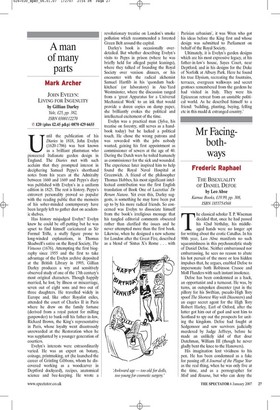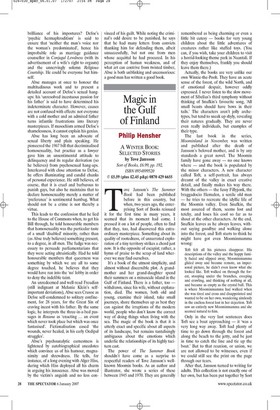Mr Facing- both- ways
Frederic Raphael THE BISEXUALITY OF DANIEL DEFOE by Leo Abse Kamac Books, £19.99, pp. 308, ISBN 1855754568 The classical scholar T. P. Wiseman decided that, once he had passed his 42nd birthday, his middleaged hands were no longer apt for writing about the erotic Catullus. In his 90th year, Leo Abse manifests no such squeamishness in this psychoanalytic study of Daniel Defoe. Neither embarrassed nor embarrassing, he sees no reason to abate his hot pursuit of the more or less hidden impulses that, he argues, enabled Defoe to impersonate both Robinson Crusoe and Moll Flanders with such instant insolence.
Defoe has been condemned as a hack, an opportunist and a turncoat. He was, by turns, an outspoken dissenter (put in the pillory for his Swiftian, pseudo-High Tory spoof The Shortest Way with Dissenters) and an eager secret agent for the High Tory Robert Harley, Earl of Oxford, after the latter got him out of gaol and sent him to Scotland to spy out the prospects for uniting the kingdom. Defoe had fought at Sedgemoor and saw survivors judicially murdered by Judge Jeffreys, before he made an unlikely idol of that dour Dutchman, William III (though he never gladly bent the knee to the Hanovers).
His imagination lent vividness to his pen. He has been condemned as a fake for passing off A Journal of the Plague Year as the real thing, when he was only five at the time, and as a pornographer for Moll and Roxana, but who can deny the brilliance of his impostures? Defoe's 'psychic hermaphroditism' is said to ensure that 'neither the man's voice nor the woman's predominated', hence his improbable role as marriage guidance counsellor in Conjugal Lewdness (with its advertisement of a wife's right to orgasm) and the unnervingly solemn Religious Courtship. He could be everyone but himself.
Abse manages at once to honour the multitudinous work and to present a detailed account of Defoe's sexual hangups: his 'unresolved incestuous passion for his father' is said to have determined his indeterminate character. However, causes are not confused with effects: not everyone with a cold mother and an admired father turns infantile frustrations into literary masterpieces. If masochism armed Defoe's shamelessness, it cannot explain his genius.
Abse has long been an advocate of sexual liberty and plain speaking. He pioneered the 1967 bill that decriminalised homosexuality, but practice as a lawyer gave him an unsentimental attitude to delinquency and its regular derivation (so he believes) from psychosexual hang-ups. Interleaved with close attention to Defoe, he offers illuminating and candid chunks of personal experience. He still believes, of course, that it is cruel and barbarous to punish gays, but also he maintains that to declare homosexuality merely a matter of 'preference' is sentimental humbug. What should not be a crime is not thereby a virtue.
This leads to the confession that he lied to the House of Commons when, to get his Bill through, he told honourable members that homosexuality was the particular taste of a small 'disabled' minority, rather than (as Abse truly believes) something present, to a degree, in all men. The fudge was necessary to persuade parliamentarians that they were acting altruistically. Had he told honourable members that queerness was something by which we are all to some degree touched, he believes that they would have run into the 'no' lobby in order to deny the indelible taint.
An unredeemed and well-read Freudian (still indignant at Melanie Klein's selfimportant deviations), Abse sees Crusoe as Defoe self-condemned to solitary confinement, for 28 years, for the Great Sin of craving incest with his father. By the same logic, he interprets the three-in-a-bed passages in Roxana as 'enacting ... an event which never took place but which was once fantasised'. Fictionalisation eased `the wounds, never healed, in his early Oedipal struggles'.
Abse's psychoanalytic earnestness is lightened by autobiographical anecdotes which convince us of his humour, magnanimity and shrewdness. He tells, for instance, of a long evening with Alger Hiss, during which Hiss deployed all his charm in arguing his innocence. Abse was moved by the victim's anguish and no less convinced of his guilt. While noting the criminal's odd desire to be punished, he says that he had many letters from convicts thanking him for defending them, albeit unsuccessfully, but not one from men whose acquittal he had procured. In his perception of human weakness, and of what art can contrive from twisted timber, Abse is both unblinking and uncensorious: a good man has written a good book.





































 Previous page
Previous page